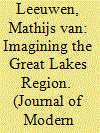| Srl | Item |
| 1 |
ID:
123460


|
|
|
|
|
| Publication |
2013.
|
| Summary/Abstract |
The eastern Democratic Republic of Congo (DRC) has been characterised by chaos and insecurity for a number of years, but the rise of the M23 rebellion in 2012 once again highlighted just how dire the humanitarian and security situation is. For most of 2012, the crisis was addressed through negotiations between M23 and Kinshasa, mediated by the International Conference on the Great Lakes Region (ICGLR). However, 2013 marked the signing of the Peace, Security and Cooperation Framework Agreement (PSC Framework), and the United Nations Security Council's adoption of Resolution 2098, which contains the mandate of the long-awaited Intervention Brigade (IB). The PSC Framework calls on Kinshasa to implement substantial political reforms while also urging the neighbours of the DRC to stop interfering in its internal affairs. The IB is mandated to carry out targeted operations against the so-called 'negative forces' that operate in the eastern DRC. For now, hope of resolving this ongoing crisis hinges on the continuing ICGLR negotiations, the implementation of the PSC Framework and the success of the IB. However, there are critical questions about all of these processes that need to be answered and understood, as the expectations for these processes - especially in the case of the IB - are extremely high. Will the ICGLR manage to negotiate a peace agreement and will the IB succeed, or will they go down in history as yet another failure to save the eastern DRC?
|
|
|
|
|
|
|
|
|
|
|
|
|
|
|
|
| 2 |
ID:
084473


|
|
|
|
|
| Publication |
2008.
|
| Summary/Abstract |
The idea has gained ground in recent years that, as conflicts in the countries of the Great Lakes Region are strongly interlinked, regional approaches are necessary to resolve them. This interest in regional dimensions of conflict and peacebuilding also gains currency in other parts of the world. Attention to regional approaches is reflected in the efforts of international organisations and donors to promote civil society peacebuilding. They assume that regional cooperation and exchange between civil society organisations contribute to peace, and provide an alternative to single-country interventions or regional diplomatic initiatives. This paper explores how such assumptions work out in practice. Experiences in the Great Lakes Region show that local and international organisations have difficulty in analysing the regional character of conflict and arriving at collaborative regional strategies. Moreover, local civil society organisations are deeply embedded in the politics of regional conflict. Consequently, the shift to regional peacebuilding approaches remains more theoretical than practical. This paper suggests that international supporting organisations need to adjust their ambitions in regional peacebuilding, but nonetheless have roles in fostering regional identification among civil society organisations.
|
|
|
|
|
|
|
|
|
|
|
|
|
|
|
|
| 3 |
ID:
102749


|
|
|
|
|
| Publication |
2011.
|
| Summary/Abstract |
The Allied Democratic Forces (ADF) have inflicted damage and insecurity on the Rwenzori region of Uganda for over a decade and, although their strength has diminished, still constitute a threat. This article argues that it is inadequate to see the ADF primarily as an internal Ugandan rebel group. Rather, the group's cross-border dimension with the Democratic Republic of the Congo should be conceptualised as a transnational phenomenon. A borderland analytic framework offers the best means of understanding the movement.
|
|
|
|
|
|
|
|
|
|
|
|
|
|
|
|